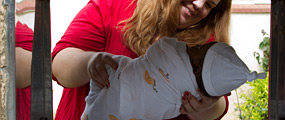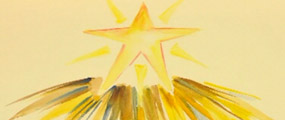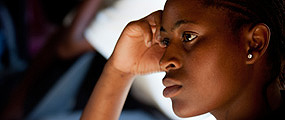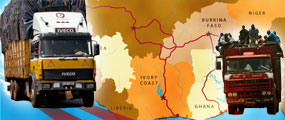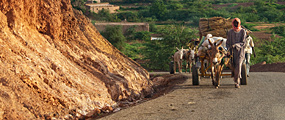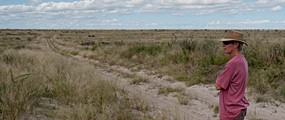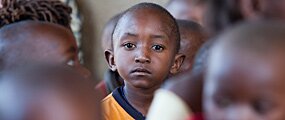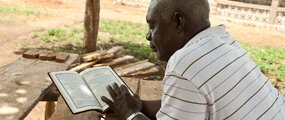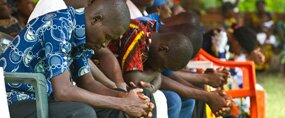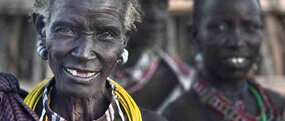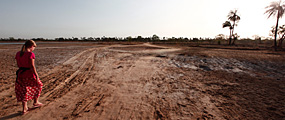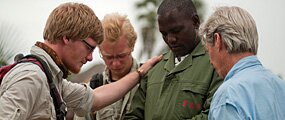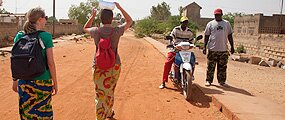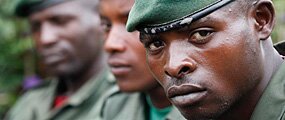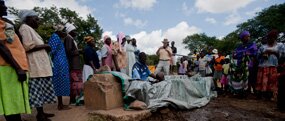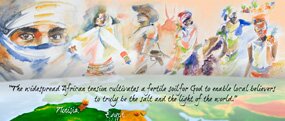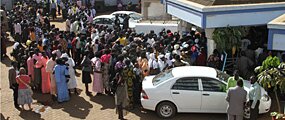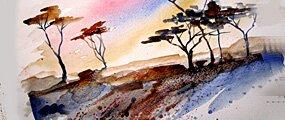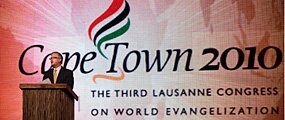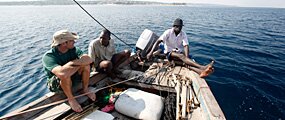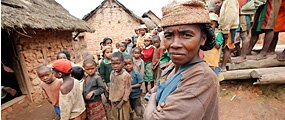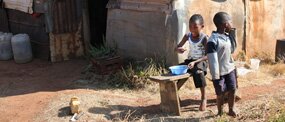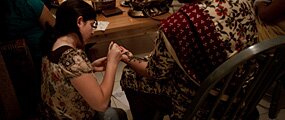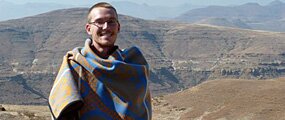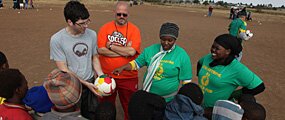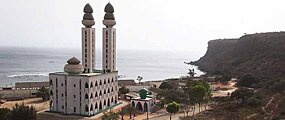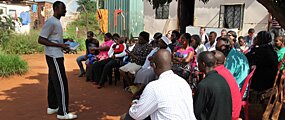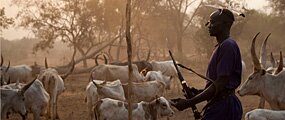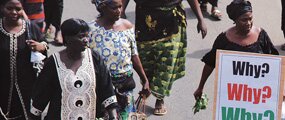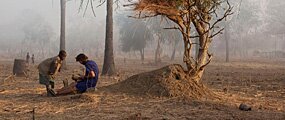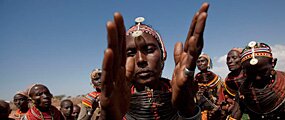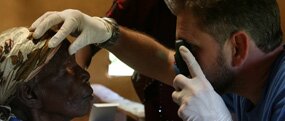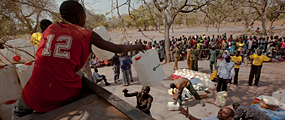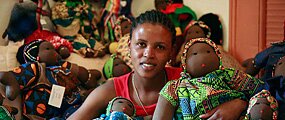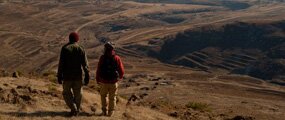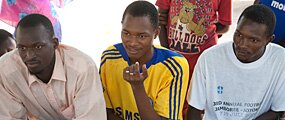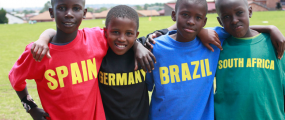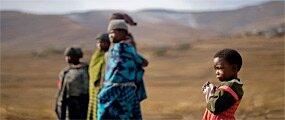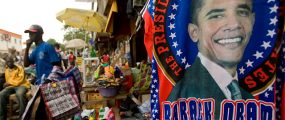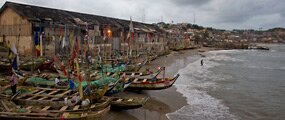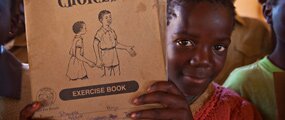Unique Experiences
Posted August 18,2010
The Missionaries:
Justin Morgan, age 22
Hometown: Destin, Florida
Home church: Emmanuel Baptist Church
Korby Griffith, age 24
Hometown: Atlanta, Georgia
Home church: Church In The Hills
On the field since April, 2010, Justin and Korby evangelize and disciple Basotho people in the remote mountains of Lesotho. They spend 4-6 weeks living in a small hut in Matsaile, traveling on foot or horseback to six other villages that need the Gospel, then head to the capital city for a brief break to buy supplies and reconnect with the outside world.
Follow their journey:
April 21, 2010 (by Korby):
 A big chunk of the week was spent preparing things to be moved to our rondavel (our hut) and spending time with our team. We have purchased a solar panel system that we will be taking with us so that we will have electricity in Matsaile (our village). It won’t be anything fancy, but it will be nice having lights and such while we are away for 6 weeks at a time.
A big chunk of the week was spent preparing things to be moved to our rondavel (our hut) and spending time with our team. We have purchased a solar panel system that we will be taking with us so that we will have electricity in Matsaile (our village). It won’t be anything fancy, but it will be nice having lights and such while we are away for 6 weeks at a time.
Just yesterday we went horseback riding to shake off the cobwebs. We didn’t learn too much that was new, but getting used to riding a horse is never a bad thing when that will be our main mode of transportation.
Lesotho is a different kind of place than what I am used to though. It is definitely much more of a cold culture, meaning you don’t see as much of the communal nature that you see all across Africa. I don’t know what it is, but people don’t wave, or talk, or even smile most of the time as you pass by. We have gotten to talk to a few Basotho, all of which have been very nice to us, but only after we pursued a conversation first. One thing that is very exciting though is that we learned a new game that is very popular in Lesotho. It is a shepherd’s game called morabaraba. It’s simple, but complicated and we are trying to learn as a possible way to make relationships with the Basotho.
July 12, 2010 (by Justin)
It’s late in the afternoon, the smell of smoke fills the air, in my hand is a piece of raw organ meat, and I look at Korby and say, “I think I have my next story.”
 Rewind. It’s late morning and I step outside our rondavel and I notice that there is a group of people in the field. It seems they are beating something. We decide to go and find that the men have sticks in their hands and they are rhythmically chanting and beating a pile of sorghum. Then they stop and rest. The women sweep up the seeds and pour it from bowls, allowing the wind to sift the wheat from the chaff. While the women do this, the men eat a mixture of corn and beans and drink porridge and beer made from the sorghum. Then they stand up, pick up their clubs and begin again. It only made sense to grab a club and join in. We start beating and getting the timing of the swings, which correspond with the chanting. We go for a while and then that round is complete. After that round we had to leave, but you could tell they were very pleased that we joined in.
Rewind. It’s late morning and I step outside our rondavel and I notice that there is a group of people in the field. It seems they are beating something. We decide to go and find that the men have sticks in their hands and they are rhythmically chanting and beating a pile of sorghum. Then they stop and rest. The women sweep up the seeds and pour it from bowls, allowing the wind to sift the wheat from the chaff. While the women do this, the men eat a mixture of corn and beans and drink porridge and beer made from the sorghum. Then they stand up, pick up their clubs and begin again. It only made sense to grab a club and join in. We start beating and getting the timing of the swings, which correspond with the chanting. We go for a while and then that round is complete. After that round we had to leave, but you could tell they were very pleased that we joined in.
We were on our way back from getting water when a man approaches us and asks if we want to come watch them slaughter a cow. Well of course. We go and watch them kill it by stabbing a spear into its heart. We later learn this is a distinct way of killing the cow. Then they begin dressing the cow, taking the big pieces aside for later and eating the smaller pieces. They build a fire in the pen, also called a kraal or lesakeng. They cut the meat, covered in blood, throw it on the fire with a little spice and cook it. Then they take the meat off, hands still covered in blood, and hand it to us. It’s too tough to bite off so we have to cut it. To help with this they bring us a plate. Our plate consists of a rock taken from the wall of the kraal. I notice that the kraal is made with stones and dung. The meat is surprisingly good. Then comes the second course, mystery organ meat. They bring it and put it on our table. I cut off a piece, put it in my mouth, and in the words of Korby, it explodes with liquid. I look at my hands and knife, and they are covered in blood, tasty.
 It turns out this was a three day event to celebrate the passing of a grandmother. That is why the cow was killed the way it was. Still not clear why it has to be in the heart. We did learn that they believe that a cow must be killed so that the grandmother will have a guide in the next life. However, we did not learn this until the third day. On the second day, we had dinner with about 100 people from the village. On the third day, we were treated to a special meal of cow innards and cow heart. It was then we found someone with enough English to explain what was happening. I am not recommending going to such an event, but afterwards the attitude of the people towards us changed dramatically.
It turns out this was a three day event to celebrate the passing of a grandmother. That is why the cow was killed the way it was. Still not clear why it has to be in the heart. We did learn that they believe that a cow must be killed so that the grandmother will have a guide in the next life. However, we did not learn this until the third day. On the second day, we had dinner with about 100 people from the village. On the third day, we were treated to a special meal of cow innards and cow heart. It was then we found someone with enough English to explain what was happening. I am not recommending going to such an event, but afterwards the attitude of the people towards us changed dramatically.
That is the reason I tell this story. Not so much to gross you out, but to tell you of the watershed event of our first month. After this event, our last two weeks were like night and day compared to our first two weeks. When we arrived in Matsaile we found the culture of the Basotho to not be very warm. The first two weeks were spent with limited interaction with people. The two weeks after the event, people were calling to us just to say hello, starting and carrying on conversations with us, and even calling us by Basotho names that we were given. Mine is Thabiso, which means “one that brings joy.” Korby’s is Tsepo, which means “hope.” And it all started with us going to the field and beating sorghum.
We know it was ancestral worship, which is not what we are to partake in. But it seems God is even using that to open hearts and minds to His message and to us.
August 16, 2010 (by Korby)
It was cold outside, but inside the small house I was beginning to sweat beneath my blanket. It was going on 10 o’clock at night. The next day we would be burying the brother of our friend Sam and the entire community had come together to comfort the family by staying up all night with them.
 For the past hour, we had been sitting in this room going through the same routine; someone would stand up, give a speech that related to the deceased, and then slowly, someone would start a song and the rest of the room would join in. Once the song was finished, someone else would stand up and start the process again. I was beginning to think it was going to be a long night when a young man stood up and starting talking in a very passionate voice. I must admit that I couldn’t understand anything of what he said, but his passionate speech seemed to wake up the crowded room. When he had finished his speech, once again someone started singing.
For the past hour, we had been sitting in this room going through the same routine; someone would stand up, give a speech that related to the deceased, and then slowly, someone would start a song and the rest of the room would join in. Once the song was finished, someone else would stand up and start the process again. I was beginning to think it was going to be a long night when a young man stood up and starting talking in a very passionate voice. I must admit that I couldn’t understand anything of what he said, but his passionate speech seemed to wake up the crowded room. When he had finished his speech, once again someone started singing.
But this time it was different.
As one lady started singing, almost as if on cue, one half of the room jumped up from where there were sitting and began to dance. At first it seemed random, but it quickly became apparent that they were forming two circles; one inner circle of people with an out circle formed around it.
And they danced.
And they would continue to dance for the rest of the night. Most of them would not even sit down or rest their legs for hours. Over and over, one person would stop the singing and dancing, speak their peace, and then start the singing again. Justin and I joined in the dancing in a circle all through the night.
 During the night, several interesting things happened. At one point, our friend Sam told us that if we wanted to speak, then we would be welcome to say a word to the crowd. So after a while of waiting our turn, we were able to finally speak. When the room had quieted down, we tried desperately to find someone to translate. This was a moment that was perfect for sharing the gospel, but we didn’t have the language to share. Everyone, even our friends refused to translate. But we did not allow that to deter us and so we shared the gospel anyway. Although it was in English, those that understood what we were saying gave a summary to those who didn’t understand. Even though not everyone understood our message, we were very encouraged that we got to share the gospel with the whole village.
During the night, several interesting things happened. At one point, our friend Sam told us that if we wanted to speak, then we would be welcome to say a word to the crowd. So after a while of waiting our turn, we were able to finally speak. When the room had quieted down, we tried desperately to find someone to translate. This was a moment that was perfect for sharing the gospel, but we didn’t have the language to share. Everyone, even our friends refused to translate. But we did not allow that to deter us and so we shared the gospel anyway. Although it was in English, those that understood what we were saying gave a summary to those who didn’t understand. Even though not everyone understood our message, we were very encouraged that we got to share the gospel with the whole village.
Perhaps even more encouraging to us was that our friends got to share during the night also. UK (Thabong) and Coolio (Thabo) both shared stories and lessons from the Bible. It is so encouraging to sit there and watch our friends share stories of Jesus to their own village. This is our goal. We want to disciple these guys and let them change the lives of the people in their village. They know the culture so much more than we do and they can communicate to their fellow Basotho on a completely different level than what we can. This is our goal and this was the highlight of our night: Basotho men sharing the gospel with Basotho people. That is a good start.
Although it was a great night, it was also a night of great spiritual conflict. We suspected it, and found out later that all through the night, several prayers were said. Some of these prayers were to God, but a lot of the prayers were also to the ancestors. And this is a great example of our greatest struggle. Many people in Matsaile will tell you they believe in God and that they pray to him. But they will readily admit that they believe that you can believe both in God and in ancestors. Syncretism seems to be completely accepted: even in the church.
In the end, we ended up staying up that night until 5:00 A.M. dancing.
 They next day we met and took part in the funeral. I think this was a great step in becoming part of the community and showing the village that we truly care about them.
They next day we met and took part in the funeral. I think this was a great step in becoming part of the community and showing the village that we truly care about them.
Overall this was a very conflicting experience. On the one hand it was so encouraging to see our friends step and share their faith with the community. But, on the other hand, our hearts are continually crushed because their eyes are closed to idolatry that they practice everyday with ancestor worship.
So I say all that to say please pray for us continually.
First, please pray that our friends will continue to be hounded by the Holy Spirit and thirst daily for the Word. Pray that they will understand what they read and although we can’t speak a great amount of language, that we will be able to guide them in their journey.
Second, please pray that God will open the eyes of the Basotho to their idolatry and false beliefs. Pray that people will realize that worship of Jesus and worship of ancestors just don’t mix.
Read more stories from Justin and Korby: http://prayforlesotho.wordpress.com
See their pictures: http://s1017.photobucket.com/home/Lesotho2010/
Watch their video updates

